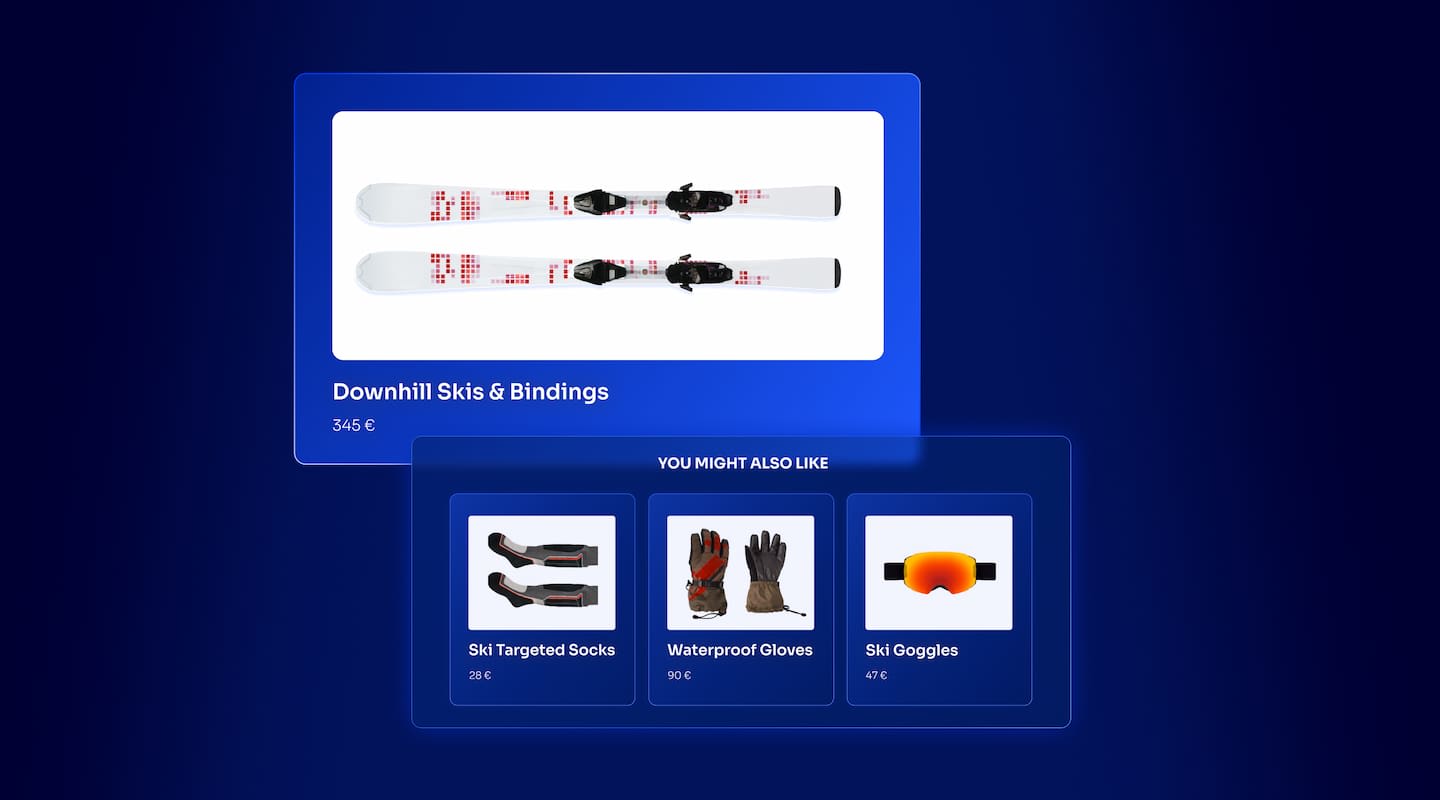Add InstantSearch and Autocomplete to your search experience in just 5 minutes
A good starting point for building a comprehensive search experience is a straightforward app template. When crafting your application’s ...
Senior Product Manager

A good starting point for building a comprehensive search experience is a straightforward app template. When crafting your application’s ...
Senior Product Manager

The inviting ecommerce website template that balances bright colors with plenty of white space. The stylized fonts for the headers ...
Search and Discovery writer

Imagine an online shopping experience designed to reflect your unique consumer needs and preferences — a digital world shaped completely around ...
Senior Digital Marketing Manager, SEO

Winter is here for those in the northern hemisphere, with thoughts drifting toward cozy blankets and mulled wine. But before ...
Sr. Developer Relations Engineer

What if there were a way to persuade shoppers who find your ecommerce site, ultimately making it to a product ...
Senior Digital Marketing Manager, SEO

This year a bunch of our engineers from our Sydney office attended GopherCon AU at University of Technology, Sydney, in ...
David Howden &
James Kozianski

Second only to personalization, conversational commerce has been a hot topic of conversation (pun intended) amongst retailers for the better ...
Principal, Klein4Retail

Algolia’s Recommend complements site search and discovery. As customers browse or search your site, dynamic recommendations encourage customers to ...
Frontend Engineer

Winter is coming, along with a bunch of houseguests. You want to replace your battered old sofa — after all, the ...
Search and Discovery writer

Search is a very complex problem Search is a complex problem that is hard to customize to a particular use ...
Co-founder & former CTO at Algolia

2%. That’s the average conversion rate for an online store. Unless you’re performing at Amazon’s promoted products ...
Senior Digital Marketing Manager, SEO

What’s a vector database? And how different is it than a regular-old traditional relational database? If you’re ...
Search and Discovery writer

How do you measure the success of a new feature? How do you test the impact? There are different ways ...
Senior Software Engineer

Algolia's advanced search capabilities pair seamlessly with iOS or Android Apps when using FlutterFlow. App development and search design ...
Sr. Developer Relations Engineer

In the midst of the Black Friday shopping frenzy, Algolia soared to new heights, setting new records and delivering an ...
Chief Executive Officer and Board Member at Algolia

When was your last online shopping trip, and how did it go? For consumers, it’s becoming arguably tougher to ...
Senior Digital Marketing Manager, SEO

Have you put your blood, sweat, and tears into perfecting your online store, only to see your conversion rates stuck ...
Senior Digital Marketing Manager, SEO

“Hello, how can I help you today?” This has to be the most tired, but nevertheless tried-and-true ...
Search and Discovery writer
Every time I look at the news, there is another article about the race to build new search and discovery through AI innovation. Who will win?
Everyone.
Native, AI-powered search has the potential to deliver significantly better results with a more human-like understanding. It can impact use cases as different as:
And, that’s just the start.
Until now, only Google, Netflix, Amazon, and a few other monolithic companies with huge engineering resources could hope to offer this kind of search. That’s about to change. New algorithms and technologies can give any business an easy way to implement AI search at a fraction of the cost.
With that in mind, here are 10 reasons AI search is the next big thing and what it means for businesses:
With AI search, any company can create a magical experience for customers by providing them with great search on a website or app. AI can understand intent, so whether someone searches for “cappuccino maker” or uses a longer long tail phrase with typos — “expresso machine with milk thingy” — they’ll get great results. Better results mean happier, more engaged customers, low site abandonment, and a more successful business.
What if customers could search by typing in symptoms, scenarios, questions, or even using photos? One of the technologies behind semantic search — vector embeddings — can be used for these many different scenarios. For example, image search. Health care professionals could upload photos to use as queries to find similar images to aid with diagnosis. E-commerce businesses can give their customers a way to upload photos from their phone to find similar items on a website. It opens up an entirely new avenue for people to interact with their favorite brands!
Today, site owners must spend considerable time writing relevance rules or building synonym libraries so their content is more easily discoverable. With AI search, a good chunk of that effort is automated, so businesses can re-allocate their time to work other parts of the business. In other words, AI search not only offers new capabilities and use cases, but it also greatly reduces workload!
Ecommerce businesses can have thousands to millions of SKUs on their site. When it comes to optimizing results, most companies follow the Pareto Principle: they only optimize the top 20% of their catalog. There is still a lot of value in the other 80% however, which is sometimes called the long tail. These are typically products with low search volume and less demand that collectively offer huge value for sellers. Customers often use more descriptive, intent-driven phrases to find these products, and this is where AI search excels.
There is an immense value tied into enterprise search and corporate intranets. Studies have shown that intranets can improve employee productivity and time, but information is often locked away and inaccessible. AI search can improve internal intranets, databases, and knowledge bases by making information easier to discover.
One study showed that product recommendations account for up to 35% of Amazon’s total revenue. Businesses that personalize their sites can boost sales. It’s not just something that sellers want; 56% of online buyers are more likely to revisit a site with better recommendations. However, according to a 2021 report, only 21% of companies surveyed were using AI to optimize recommendations. In fact, AI search technologies can power recommendations, too, and in entirely new ways using data that companies are collecting from many different sources like customer clicks, search history across every customer, product category, ratings, and more, to deliver better results.
For retail, the idea of servicing online visitors on their websites in a more optimized and personalized manner is a continuing challenge. Imagine, for a moment, the idea of a visitor arriving at an online store and being met by an avatar that immediately starts a real conversation – not these stilted, scripted chatbot responses that more often frustrate than provide any benefit. As a visitor, you describe what you’re seeking and the avatar brings you to that product. This is no longer science fiction. It’s conversational commerce based on technologies such as GPT4 and Algolia AI search, which can dramatically improve the consumer experience and increase revenue for retailers. Generative AI technology acts like a sales clerk to gather information and offer advice, while search retrieves, ranks, and displays the products that match the buyer’s criteria.
AI is all about data. The more data you have from search, clicks, conversions, ratings, reviews, etc., the more it can be improved. For example, when it comes to scale, few online businesses have a greater challenge than marketplaces. The amount of data produced by marketplaces is staggering: millions of products divided into hundreds of different categories; terabytes of data related to product descriptions and images; hundreds, if not thousands, of separate vendors over which the marketplace has limited control; and user-generated content that has little quality control. Search has traditionally eluded marketplaces — or any application of similar proportion. This is one of the places in which AI search really shines because it makes content easily discoverable for even the largest catalogs.
In years gone by, search engines have trained us — the users — to simplify our queries. Longer, complex queries were often confusing to search engines, so we simplified our phrasing. That’s about to change! Now, businesses can add AI-powered natural language search understanding to make voice voice, chat, or text search work… well, naturally. AI technologies in conjunction with NLP technologies — which help structure queries and language to deliver better results — give users a great way to interact with their favorite apps using common phrases to find what they’re looking for.
AI search improves search so well, customers may think websites are reading their minds! Better relevance, better results add up to better conversion rates and returning customers. One of our marketplace customers with 3+ million SKUs saw a 6% increase in search conversions — in just the first month before any additional optimization!
AI search opens up a whole new slew of use cases and gives site owners a new tool for driving engagement, brand, and customer experience. What would take years and scores of engineers to build can now be accomplished in minutes — at a fraction of the cost.
Learn more about Algolia NeuralSearch, our next-generation native AI search platform.
Powered by Algolia Recommend